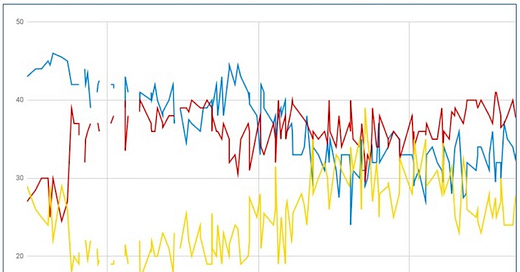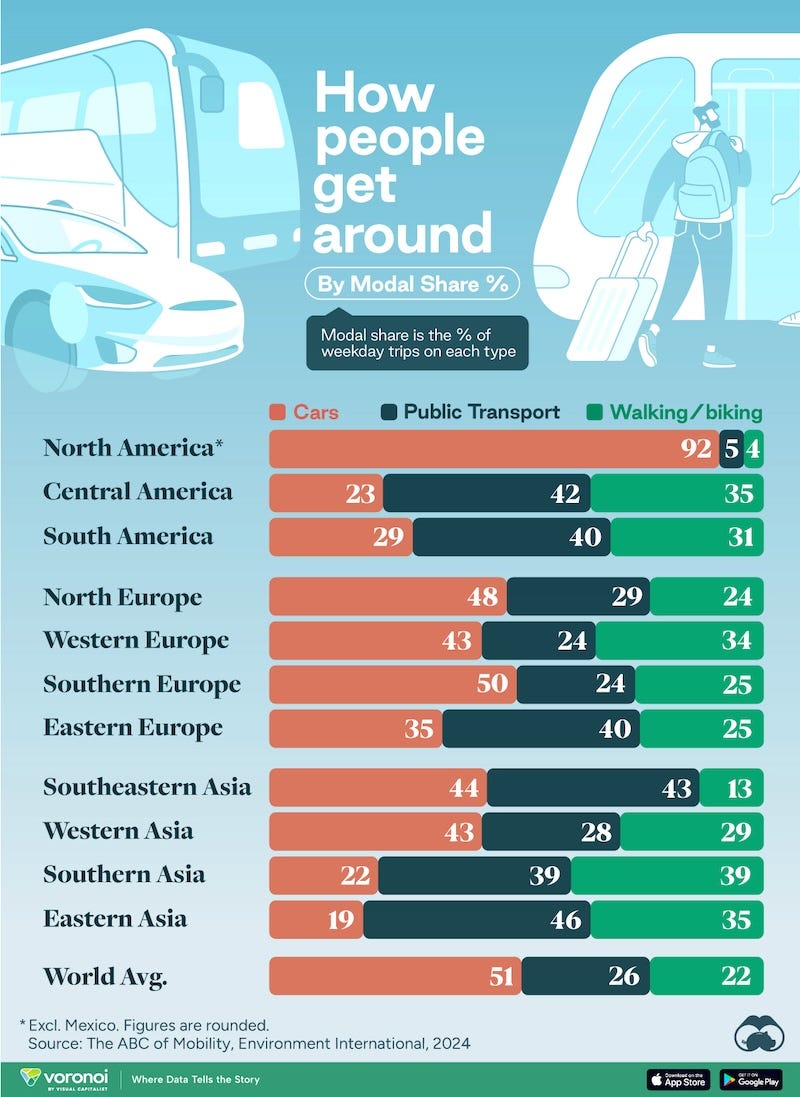Canadians Aren’t Listening to Climate Messaging? Maybe It’s Time to Listen Back.
A deep affordability crisis plus relentless misinformation from the fossil industry are driving climate change lower on the public opinion radar. Where are the new strategies to push back better?
Amid the last couple of weeks of cascading concern about destructive wildfires, coastal sea level rise, big banks’ investment decisions driving climate chaos, and hopeless and broken climate scientists, there’s something else to worry about.
The latest opinion research by the excellent Re.Climate climate communications initiative has Canadians attaching less importance to climate action. Showing less support for policies that may increase costs. And buying into the industry spin that puts oil and gas at the centre of the country’s economic future.
The research even indicates a decline in the proportion of Canadians who believe climate change is real and caused by human activity. From the Re.Climate data, it seems like the deeper the climate crisis gets, the harder the wider climate community fights to get an essential message across, the farther behind we fall.
You would almost think it was time for a new strategy.
Shouting Louder
There’s been a good deal of consternation, not to say panic, about the data. That reaction makes perfect sense within the usual frame of climate communications and messaging. The question comes down to: What more do we have to do, how much worse does the emergency have to get, what new messaging tools and techniques do we have to try out, for people to finally “get it” that climate change needs their undivided attention?
There’s even an often very good national publication building part of its annual subscription drive around the fear that more Canadians are turning their gaze away from climate change when we need all hands on deck. Their call to action is based on an assumption that is unprovable at best and quite possibly false: that more clicks, views, and subscriptions on even the best news website will translate measurably into lower greenhouse gas emissions. I don’t think we have any evidence to connect those dots, not without a level of targeting and follow-up that is beyond the expectations and resources of most news outlets, certainly in Canada.
But seriously—can we really wonder why pocketbook concerns are dominating public conversation when so many people are hurting? Is it any surprise that climate denial and support for the fossil industry are ticking up when the industry knows it’s in an existential fight and is investing its lavish PR budget accordingly?
Re.Climate’s analysis leads into a call to “close the public literacy gap” on climate change, build a narrative about Canadians being able and willing to take on big challenges, push more provincial governments and national media to join the fight, and nurture a wider mix of climate messengers to tell the story.
Those are all worthy strategies, extensions of the decades-long effort that has brought us as far as we’ve been able to get up to now. But they may not carry us far enough, fast enough to get the public buy-in we need for faster, deeper carbon cuts. Good thing there’s another side to this coin.
Drawing a Different Conclusion
What if we flipped the conversation, started out with the biggest fears and worries people woke up with this morning, and discovered together how a climate lens helps solve them, while still achieving real emission reductions and resilience gains?
The headline priority across Canada is to get more affordable housing spaces, and get them fast. So why shouldn’t that be a platform for net-zero new construction, deep energy retrofits, and “missing middle” planning to help prevent urban sprawl, as long as those measures are baked into the plan (which they largely were) and not watered down under pressure from politicians like Ontario’s Doug Ford, who apparently never met a fourplex he couldn’t hate?
Getting a free or low-cost transit pass, ideally one that connects to an affordable bike share system, makes it easier and less expensive for teens, young adults, and people in struggling households to move about town. If it also eliminates the tailpipe emissions they would otherwise produce while they were stuck in traffic, could it be that we’ve found a way to mutate Pierre Poilievre’s “personal freedom” mantra into a climate solution?
The price of building enough political support for a massive energy and climate transition bill in the United States was calling it the Inflation Reduction Act and giving coal state Sen. Joe Manchin all the credit for getting it done. Which rankled for many of us. But has that language impeded a cascade of project activity across the U.S. or prevented a global arms race for clean energy investment?
New research from UCLA tells us that infrastructure projects gain public backing with a few paragraphs of local context that explain how they help the community. So how does that shift in the storyline apply to low-carbon infrastructure? We know the local context won’t be written by defunded community papers and broadcasters that are scrambling for resources. So does it help advance a climate agenda if we work to renew a local media landscape that also combats the rampant dis- and misinformation that always, always play to the fossil industry’s advantage?
All of these steps and so many more align climate action and results with things people want and desperately need in their lives, without having to haggle over all the needlessly controversial “c words” like “climate”, “carbon”, and “crisis”.
That’s deeply unsatisfying if we think the only way to win on climate change is to shout louder.
But it may well be a quicker route to building the deeper public buy-in we need than starting out from a frame that tells people their basic assumptions are wrong. That we know better. That they need to rethink some important things they were sure they knew, just because we said so and told them it was urgent.
If this 30° shift in our approach works, it doesn’t make the Re.Climate research any less important. It just means responding to it in a more strategic way, using it as a catalyst to get where we need to go, faster and more smoothly. Because, as every climate hawk anywhere, ever will quite rightly tell you, we don’t have time to waste.
A Different Conversation
One area where we consistently fall short at The Energy Mix and The Weekender is that we don’t talk nearly often enough or loudly enough about the Green Resilience Project. It’s an initiative we run alongside the Basic Income Canada Network (BICN) that supports local conversations at the intersections between income security, local resilience, and climate action.
In a mostly standardized approach that the Green Resilience team began testing a few years ago, our local partners don’t arrive at their sessions with a lecture about climate change, nor even about the latest opinion data on climate change. They tailor the session format to local needs and interests, start things off with a series of open-ended questions, then listen carefully to where each group takes the conversation.
Invariably, what we hear back from participants is that they’re well aware that climate change is reshaping their communities as they speak. Even if they aren’t comfortable using any of the usual “c words”, they see the impacts of wacky weather, killer heat, and raging wildfires before their eyes. They’re crystal clear and sometimes luminously angry about the intersecting factors—precarious jobs and incomes, expensive food and housing, sketchy transit access, and more—that push climate change farther down on their daily priority list.
And if you take away one thing from today’s post, take away this: Most local participants have a very good idea of what they would do to reduce emissions, boost economic self-reliance, and increase disaster resilience and preparedness in their communities, if they had the resources to get it done. If they weren’t being held back at every turn by bigger-picture systems and structures that are beyond their control.
(While we’re here, one of our board members at Energy Mix, BICN Chair Sheila Regehr, is a co-organizer of this year’s Basic Income Guarantee Forum May 23-26. If you’re in Ottawa, prepare to have your mind blown if you drop in.)
A Conversation That Never Happened
This is where I describe a hypothetical conversation that I’ve been thinking about for some time. I’ve shared it with dozens of very patient friends and colleagues in the wider climate community over the last few years. They don’t like where it leads, and neither do I. But I’ve yet to see anyone spot a fatal flaw in the conclusions I try to draw. (Challenge accepted, you say. The comments section is open!)
We’re sitting in a coffee shop before the pandemic, back in the day when all the seating was too close together and everyone could hear each other’s business. We’re talking about climate change because, really, it’s 2019—what else is there to talk about?
We notice someone sitting nearby who shouldn’t be eavesdropping. But he is, and he’s getting agitated. Then he comes over.
“I know I shouldn’t be listening in, but you people were getting kind of loud,” he says. “And I can’t stand any more of this bullsh*t about ‘climate this, crisis that, carbon the other’. Everyone knows it’s all just a big myth!
“But here’s an idea if you want a real crisis to talk about. I’m just back from burying my sister, and two months ago it was my nephew. If you want to make yourselves useful, why don’t you drop all this stuff about climate change and help us do something about the opioid crisis? And do something that matters for a change?
“You people make me sick.”
He stalks away, and we both take a breath.
I’ll emphasize again that I’ve never been in this conversation, though I have to think it must have happened somewhere, sometime. But a couple of things are true. The crisis he’s talking about is real, it’s devastating, and it’s raging out of control. His pain is unimaginable, unutterable. And there was nothing in the way he presented it that will change the priorities that you and I wake up with tomorrow morning.
So if it doesn’t work on us when we’re on the receiving end, why do we think that just yelling louder will work when we’re the ones doing the yelling, even if we can get a new group of messengers to do some of the yelling alongside us?
Building Community, Finding Hope
Here’s another approach. We’ve talked before about Will Grant of the U.S. Pachamama Alliance. His 10½-minute video defines four levels of climate action, from individuals to national and international institutions. It defines the local level (in his terms, Level 3) as the ground where regular people can have the greatest impact, build hope for a better future, and bring others along with them. It’s also the space where we’ll find successful projects that can be repeated and scaled, across the same community and beyond.
“Say I get into the local school to put solar panels on the roof. I can actually get that done. That’s a project I can see through from beginning to end in a year or two,” Grant said. “But the conversation that I get to generate at the school is a big piece of the change. The conversation with the principals, and with the students, and with the PTA, is as useful as the change itself. We’re getting into the idea that we can do something about this.”
Grant’s approach to local climate action doesn’t “cut with both arms of the scissors”. It promotes community alternatives and emission reductions, but doesn’t get us closer to the fossil fuel phasedown we also need, at least not right away.
That makes this whole line of thought a complement, not a replacement, for the harder-edged advocacy the climate emergency also demands.
But if what we’re doing now were enough on its own to build the critical mass to win, we already would have.
So, sure, one takeaway from the Re.Climate analysis is that we need to staff the barricades and redouble our efforts. But maybe the other, more important question is what else we can do next.
Mitchell Beer traces his background in renewable energy and energy efficiency back to 1977, in climate change to 1997. Now he and the rest of the Energy Mix team scan 1,200 news headlines a week to pull together The Energy Mix, The Energy Mix Weekender, and our weekly feature digests, Cities & Communities and Heat & Power.
Chart of the Week
Homes Lost Outside Fort Nelson, Evacuations in Fort McMurray as Wildfires Rage
Hydro-Québec, Mohawks of Kahnawà:ke Sign Co-Ownership Deal for NYC Power Line
Ditch Hydrogen as ‘Poor Decarbonization Tool’, Citizens’ Committee Urges Edmonton
One CCS Project Cancelled, Another One Failing as Industry Navigates Very Bad Week
‘Turning Point in Energy History’ as Solar, Wind Start Pushing Fossil Fuels Off the Grid
Decarbonization Running ‘Faster and Deeper’ than Expected, Transition Expert Says
Ontario Misses Target in Push for 1,500 MW of New Gas, Still Secures Its Grid
Remembering Matthew Chapman, 1983-2024
60 Banks ‘Drive Climate Chaos’, Pour $6.9T into Fossil Fuels Since 2015 Paris Conference
Alberta Utilities Commission fines another unlicenced power generator mining bitcoin (Globe and Mail)
Exxon Feels the Heat as More Investors Assail Climate Conduct (Bloomberg)
Expanded Heat Pump Program Provides Transformative New Funding for Energy Affordability in B.C. (Ecotrust Canada)
Honda picks Port Colborne, Ont. as site of new EV battery parts plant (iPolitics)
Hitachi Energy invests $140M to upgrade Que. transformer facility (Sustainable Biz)
Analysis: Fossil fuels fall to record-low 2.4% of British electricity (Carbon Brief)
Fossil fuels generated less than a quarter of the EU’s electricity in April (Hellenic Shipping News)
IEA trims 2024 oil demand growth forecast, widens gap with OPEC (Reuters)
EU’s Von der Leyen slammed for ‘huge’ climate mistakes (Politico Europe)
BP Keen to Buy Tesla Supercharging Sites for US Expansion (BNN Bloomberg)
In Brazil, unprecedented flooding may force a political reckoning (Grist)
A Silent Threat - Impact of Climate Change On Life Expectancy Rate in Nigeria (All Africa)









There is a cultural divide between climate change believers and deniers that has changed and broadened over the years, no doubt due to a large extent to the slick marketing practices of resource extractive industries ... but there's more to it than that. I lived in Victoria for 5 years and experienced it first-hand when trying to defend old growth forest. But it wasn't just the industry itself, never mind the brutal practices of the RCMP C-IRG unit, but some individuals employed in logging would take it upon themselves to threaten old growth forest defenders directly.
Many people working for the fossil industry believe their livelihoods are threatened by climate change policies. They don't believe the hype of clean alternate employment and will do their best on an individual basis to maintain the jobs they have and resist change. Pickup truck sales have gone through the roof. Most everything about eastern Canada is greeted with vitriol. This holds particularly true for the federal government and Trudeau. Our $32B in tax dollars supporting the Trans Mountain Pipeline expansion should have been used for fighting climate change rather than squandered it for so little in return.
No doubt I'm not alone when I say that I'm really not sure how or where to start a new conversation. It takes two to tango.
With the majority of Canadians placing living affordability and health issues above climate concerns, we have to change the discourse so people realize that both affordability and health issues are driven to a large extent by climate change. The following is a recent letter to the editor in the Peterborough Examiner newspaper.
GOING GREEN PREVENTS US FROM GOING MORE IN THE RED
Many people, including some elected officials, complain that we can’t afford climate change actions because the cost of living is already not affordable. What they ignore is that much of the increase in living costs is driven by the cost of climate change effects, and reducing climate change now is much cheaper than paying for future damages.
The Climate Institute, one of Canada’s primary research organizations on the effects of climate change, released a report “Damage Control” in 2022 showing a drop in annual income of $720 per person by 2025 because of climate effects. At the same time, household costs are rising because of climate change. Food prices are increasing due to floods and droughts, 0.5 to 1.8 percentage points annually within the decade. Home insurance costs rose about $80 per household last year alone, largely because of extreme weather damage.
Health and human costs are also rising because of fossil-fuel pollution, extreme heat and diseases such as lime disease migrating north as Canada warms. The Canadian Association of Physicians for the Environment (CAPE) says that about 34,000 Canadians die prematurely every year from breathing fossil-fuel exhaust, more than died in 2022 from COVID. Gas stoves cause 13% of childhood asthma.
It’s cheaper to act now. A Study by Queen’s University shows that, with no new international agreements to reduce carbon emissions, the physical cost alone by 2100 of climate damage would be twice as high as the cost of reducing emissions now to keep the global temperature rise below 2 degrees. We also must be doing more to adapt to the changes already occurring from climate change; every dollar invested in adaptation yields $13-$15 in benefits.
Affordability is clearly a serious issue, but common sense demands that we spend money now to keep living affordable. Nothing else makes economic sense.